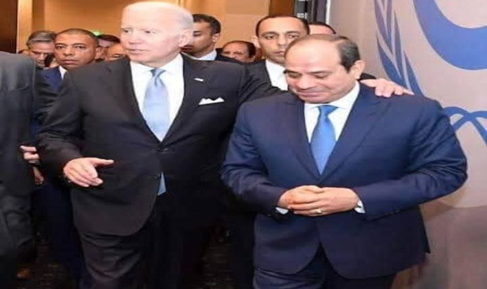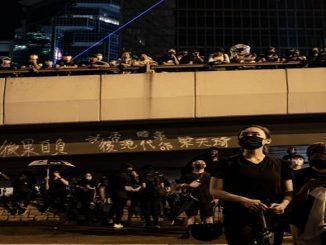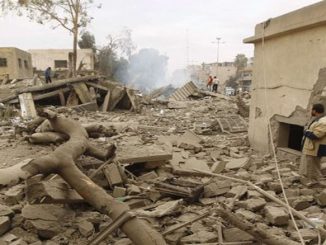
Egyptian authorities have carried out a wave of arrests targeting critics ahead of a pivotal American decision on military aid.
This is “seen as a key indicator of how the Biden administration will balance security and political interests with human rights concerns in its foreign policy,” stated Claire Parker and Missy Ryan in a piece published by The Washington Post, continuing as follows:
The crackdown, which rights groups say is emblematic of worsening repression under Egyptian President Abdel Fatah El-Sisi, has raised the stakes surrounding ongoing deliberations by the U.S. State Department, which must decide by Sept. 14 whether to withhold a portion of the roughly $1.3 billion in annual military aid to Egypt.
The looming deadline has divided U.S. lawmakers. Some are pushing the administration to deny Cairo the full $320 million share of yearly aid that is subject to rights requirements. Others oppose human rights conditions for Egypt, given its regional clout and strategic position bridging Africa and the Middle East.
A State Department spokesperson, who spoke on the condition of anonymity under ground rules set by the department, said officials were encouraging Egypt to empower civil society, protect human rights and freedoms and release political prisoners. “Progress on human rights will enable the strongest possible U.S.-Egypt relationship,” he said.
Sisi, a former general contending with a spiraling economy and growing discontent as he prepares to run for reelection, has pardoned a number of prominent political prisoners this summer, including human rights researcher Patrick George Zaki and lawyer Mohamed El-Baqer. Secretary of State Antony Blinken praised the release of Arab Spring activist Ahmed Douma last month after nearly a decade behind bars.
But rights groups say that the freeing of some high-profile political prisoners has distracted from a broader clampdown on speech and political activity, already heavily restricted in Egypt.
Story continues below advertisement
In recent weeks, authorities have detained a leading opposition figure, arrested the father of an exiled journalist, and rearrested Mahmoud Hussein, who became known as the “T-shirt detainee” after his arrest in 2014 for wearing a shirt that read “A nation without torture.”
“I don’t see any evidence or indication of progress on human rights in Egypt — not this year, not last year,” said Amr Magdi, senior researcher at the New York-based nonprofit Human Rights Watch.
Egypt, for decades one of the largest recipients of U.S. military aid, has long been viewed as a strategic ally in a tumultuous region. Cairo plays a key role in mediating between Palestinians and Israel, and U.S. officials hope it will lead a regional shift in supporting Ukraine in its war against Russia.
At a military base in northern Egypt this month, U.S. and Egyptian forces are jointly leading a massive exercise involving troops from more than 30 countries.
But under Sisi, who took power after a military coup overthrew democratically elected president Mohamed Morsi in 2013, Egypt has become one of the least free countries in the world, according to Freedom House.
Story continues below advertisement
“The human rights crisis in Egypt is a leading driver of the country’s instability and should therefore be a U.S. national security priority,” said Seth Binder from the Project on Middle East Democracy.
A year ago, U.S. officials withheld $130 million from the more than $1 billion in annual aid, but decided that Egypt had met conditions for a separate tranche of $75 million. A Democratic senator later blocked the smaller sum, and growing congressional scrutiny means that a larger share of the aid package now has conditions attached.
Since Biden took office, Sisi has taken widely publicized steps to improve Egypt’s image, beginning with the unveiling of a national human rights strategy in 2021. Last year, he called for a national dialogue, allowing opposition and civil society figures to discuss challenges facing the country and propose reforms.
The dialogue has created rare space for critical speech. But certain subjects — including anything broadly defined as a “national security” matter — are explicitly off-limits. Islamists are barred from participating.
A newly formed presidential pardons committee has granted amnesty to some political prisoners. And earlier this week, the government’s official rights body released a report, based on three years of work, which recommended limits to pretrial detention and a strengthening of due process.
The council is “strongly pressuring” officials to end speech-related detentions, Moushira Khattab, the council’s president, said at a news conference Sunday. The body was taking seriously all of the nearly 10,000 complaints of human rights violations it received, she said.
Story continues below advertisement
“There are crucial steps that were taken by the state. However, the culture of human rights remains weak,” she said. “We need to do more.”
Even as Sisi has sought to soften his image, criminal prosecutions of his critics and new restrictions on NGOs have hollowed out civil society.
Tens of thousands of “unjustly detained” prisoners remain behind bars, according to Magdi, where reports of torture are widespread. When detainees emerge, many struggle to hold down jobs or reintegrate into society, she said.
Of the $320 million linked to progress on rights, $85 million is contingent on Egypt making “clear and consistent progress in releasing political prisoners, providing detainees with due process of law, and preventing the intimidation and harassment of American citizens.”
Story continues below advertisement
Egypt does not release statistics on its prison population, and the justice and interior ministries did not respond to requests for comment.
The Egyptian Commission for Rights and Freedoms (ECRF), a Cairo-based human rights group, estimates that some 1,800 political prisoners have been released since January 2022, while more than 4,000 have been arrested since April of last year.
“In the past year and a half, for every one release, three new ones were arrested,” said Mohamed Lotfy, executive director of ECRF. “We are going backwards.”
His organization also documented 821 cases within the past year of enforced disappearance, when people simply vanish for months or years at a time.
Story continues below advertisement
Some of Egypt’s most famous political prisoners remain in jail, including British Egyptian computer programmer and activist Alaa Abdel Fattah, whose case became a flash point during last year’s COP27 climate summit in Sharm el-Sheikh.
Last week, Mohamed Adel, the former spokesperson of a pro-democracy youth movement active in Egypt’s 2011 revolution, was sentenced to four years in prison on speech-related charges. He had already spent five years in pretrial detention.
In August, Hisham Kassem, a leader of a newly formed opposition coalition and former publisher of a leading Egyptian newspaper, was detained on charges of defaming a former minister and verbally assaulting security officers. Rights groups describe the allegations as ludicrous.
Story continues below advertisement
Meanwhile, Mohamed Soltan, a human rights advocate, has said he fears for the life of his father, Salah Soltan, a former U.S.-based academic who has been jailed in Egypt since 2013.
“We fear he won’t make it to next year,” Soltan said, alleging that his father’s health problems have been neglected by authorities. He blamed the Biden administration for raising the profile of his father’s case and then failing to push hard enough for his release. “Now, it’ll take tremendous leadership and courage from others to save my dad’s life,” he said.
This summer, a group of 11 Democratic senators led by Sen. Chris Murphy (D-Conn.) appealed to Blinken to withhold the full $320 million.
“If the administration cares about protecting human rights and advancing long-term U.S. interests in Egypt, they must withhold the full amount of military aid,” Murphy told The Post.
The decision over U.S. assistance comes at a critical juncture for Sisi, who is expected to run for reelection early next year. Egyptians are grappling with record inflation, rising poverty and a hard currency shortage.
Hanging over the aid decision are broader U.S. priorities in the Middle East, including advancing normalization between Arab states and Israel and countering regional advances by Beijing and Moscow.
China brokers Iran-Saudi Arabia detente, raising eyebrows in Washington
Steven Cook, a scholar on the Middle East at the Council on Foreign Relations, said the United States continues to provide the annual aid, established after Egypt’s 1979 peace treaty with Israel, out of “both habit and a measure of fear.”
“The U.S. remains committed because there are no alternatives; it isn’t that much money; and Washington doesn’t want Egypt to collapse,” Cook said.
“I suspect the Biden team sees the aid as a way to keep the Egyptians away from China and Russia. It won’t work. The Egyptians want ties with all three.”



